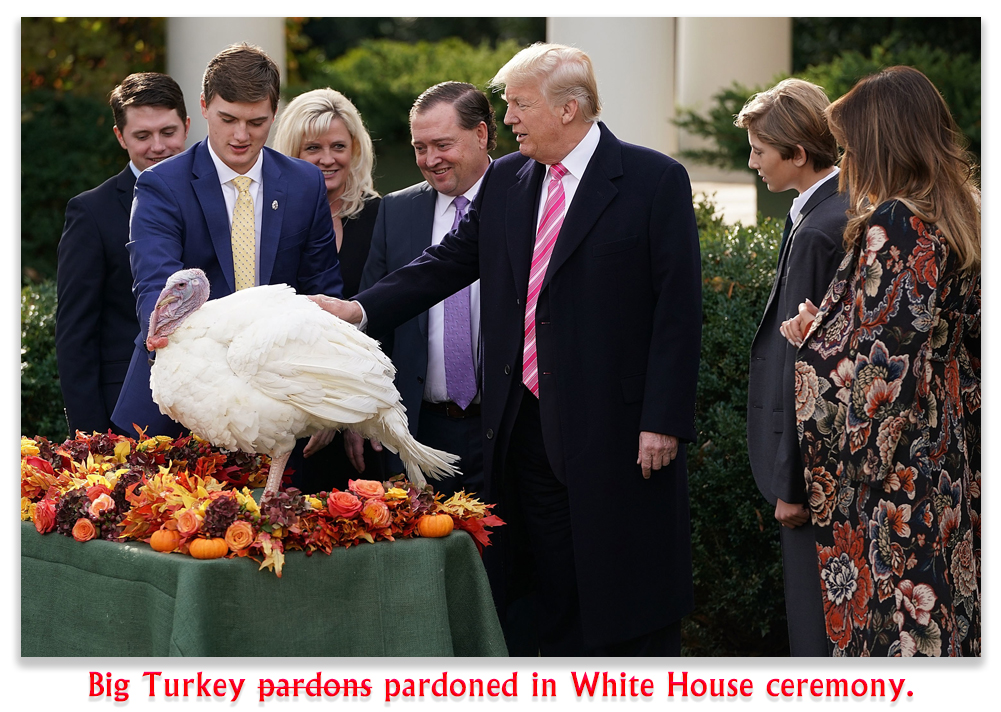We post news and comment on federal criminal justice issues, focused primarily on trial and post-conviction matters, legislative initiatives, and sentencing issues.

TURKEYS PARDONED, NOW HOW ABOUT PEOPLE?
 President Trump “pardoned” two turkeys at the annual White House ceremony held last week, but told reporters afterwards that he hadn’t considered giving any people clemency for Thanksgiving.
President Trump “pardoned” two turkeys at the annual White House ceremony held last week, but told reporters afterwards that he hadn’t considered giving any people clemency for Thanksgiving.
Speaking to reporters, Trump side-stepped a question about whether he would issue holiday pardons. “I love the pardons for the turkey,” Trump said. Asked if he would pardon any people, Trump said: “I haven’t thought of it — it’s not a bad thing.”
Behind bars, Trump has generated enormous hope for presidential clemency. Two weeks ago, he endorsed the FIRST STEP Act, after saying in October that “a lot of people” are jailed for “no reason” and that he was “actively looking” for inmates to release.
There are signs that the White House and the Dept. of Justice Office of Pardon Attorney are processing commutation requests from prisoners and pardon requests from already released inmates, making clemency advocates hopeful for near-term reprieves. Trump already has been more generous than recent predecessors early in his first term, issuing nine pardons and prison commutations. He hasn’t given any clemency grants in four months, however, in an apparent pause for the midterm elections.
Last week, New York University law professor and former federal prosecutor Mark Osler wrote that “the process used to choose which turkey might be pardoned is far more rational, efficient and effective than the one used to evaluate clemency for humans.
 First, he said, the pardons occur regularly, every year, not just in the last days of an administration. Second, decisions are made by objective specialists with the current chairman of the National Turkey Federation responsible for managing a thorough selection process. Third, there are defined criteria. The finalists are selected based on their willingness to be handled, their health and their natural good looks. Fourth, attention is paid to making sure they thrive after their grant of clemency. After the ceremony, they are sent to Virginia Tech’s “Gobbler’s Rest” exhibit, where they are well cared for.
First, he said, the pardons occur regularly, every year, not just in the last days of an administration. Second, decisions are made by objective specialists with the current chairman of the National Turkey Federation responsible for managing a thorough selection process. Third, there are defined criteria. The finalists are selected based on their willingness to be handled, their health and their natural good looks. Fourth, attention is paid to making sure they thrive after their grant of clemency. After the ceremony, they are sent to Virginia Tech’s “Gobbler’s Rest” exhibit, where they are well cared for.
By contrast, Osler said, the clemency process “is irregular, run largely by biased generalists, devoid of consistent, meaningful criteria, and it does little to ensure success of individuals after their release.”
Osler said the DOJ Pardon Attorney is part of the problem. The DOJ, “after all, is the entity that prosecutes these individuals in the first place. Within that office, staff members evaluate cases and provide a report to the pardon attorney, who decides on a recommendation after seeking out the opinion of the very US attorney’s office that prosecuted the case.
But then, instead of going to the President, the Pardon Attorney’s recommendation is routed to an aide to the deputy attorney general, who makes a recommendation to the DAG, the same DAG who is “the direct supervisor of and closely allied with the United States attorneys in the field, whose offices chose to pursue the challenged convictions and sentences in the first place.”
If the recommendation has survived this far, it goes to the White House, where some assistant to the White House counsel evaluates it and makes yet another recommendation to the boss. And, of course, that boss, who has many other duties, also has a conflict: “this time, the tendency to protect the President from risk, something that is inherent in any use of the pardon power.”
 What’s missing, Osler argued, is “all the things that make the turkey process work. It’s irregular, as inattention by any one of the numerous sequential evaluators stops the whole thing. And instead of objective specialists, we have decisions being made by the deputy attorney general, who is neither objective nor a specialist. The criteria are poorly articulated and currently issued by the stiflingly conflicted DOJ. And finally, there is little to no connection between the process and what comes after, as prison gives way to freedom.”
What’s missing, Osler argued, is “all the things that make the turkey process work. It’s irregular, as inattention by any one of the numerous sequential evaluators stops the whole thing. And instead of objective specialists, we have decisions being made by the deputy attorney general, who is neither objective nor a specialist. The criteria are poorly articulated and currently issued by the stiflingly conflicted DOJ. And finally, there is little to no connection between the process and what comes after, as prison gives way to freedom.”
Osler suggested that the process be taken from DOJ altogether and be given to an independent clemency board, as most states do. “If we did that,” Osler claimed, “the clemency process would finally be at least as functional as the one that informs a silly holiday tradition.”
Washington Examiner, Trump pardons turkeys, says he hasn’t considered human clemency for Thanksgiving (Nov. 20, 2018)
CNN, The process to pardon turkeys is more rational than the one used for humans (Nov. 19, 2018)
– Thomas L. Root


 An indictment is not multiplicitous merely because it charges more than one violation of the same statute based on related conduct; instead, a defendant can be convicted of multiple violations of the same statute if the conduct underlying each violation involves a separate and distinct act. However, where a single act or transaction is alleged to have resulted in multiple violations of the same statutory provision, the proper inquiry involves the determination of what Congress has made “the allowable unit of prosecution.”
An indictment is not multiplicitous merely because it charges more than one violation of the same statute based on related conduct; instead, a defendant can be convicted of multiple violations of the same statute if the conduct underlying each violation involves a separate and distinct act. However, where a single act or transaction is alleged to have resulted in multiple violations of the same statutory provision, the proper inquiry involves the determination of what Congress has made “the allowable unit of prosecution.”





















